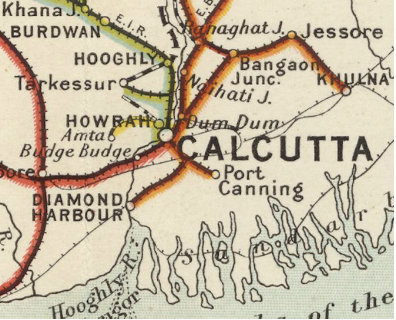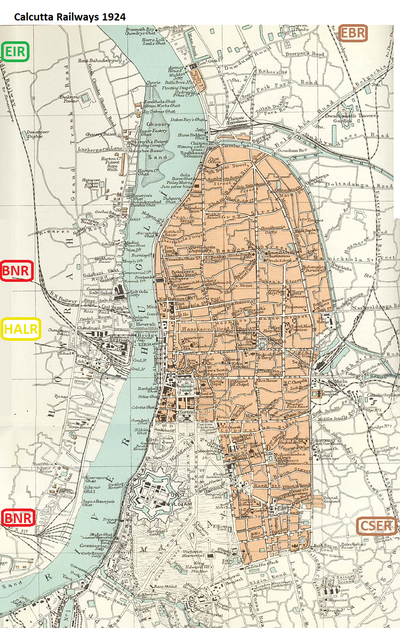Calcutta Railways & Stations
Calcutta Railways & Stations
The ‘Imperial Gazetteer, 1908’ [1] records that “Three great railways converge on Calcutta”:-
The ‘East Bengal Railway’(EBR), the terminus of which is at ‘Sealdah Station’, connects Calcutta with the North and East Bengal and Assam and on to Diamond Harbour via the ‘Calcutta and South Eastern Railway’(CSER)
‘East Indian Railway’(EIR) connects Calcutta with Bombay, the United Provinces and the Punjab, and is the outlet for the rich traffic of the Ganges valley. Its ‘Howrah Terminus’ is on the west bank of the Hooghly River. The ‘Jubilee Bridge’ at Naihati, 25 miles up the river, providing access to the Calcutta Docks at Kidderpore running over the ‘East Bengal Railway’ line.
‘Bengal-Nagpur Railway’(BNR) runs through Orissa to Madras and westward through the Central Provinces to Bombay; its terminus is also at Howrah. The ‘Shalimar Branch’ connects to a wagon ferry which operates over the Hooghly River between Shalimar and the Calcutta Docks at Kidderpore


Railways into Calcutta
Eastern Bengal Railway
EBR, Broad Gauge(BG) Marked Brown on the two Maps
- ‘EBR Eastern Section’, opened in 1862 from the Calcutta Terminus which became the ‘Sealdah Main Station’ via Dum Dum and Ranaghat to Poradaha opened in 1862 and extended in 1864 to Kushtia. This became the ’EBR Eastern Section’ - see separate page
- ‘EBR Central Section’, opened in 1882-84 by the ‘Bengal Central Railway’ from Dum Dum, in the northern suburbs of Calcutta to Khulna, via Bangaon and merged with the EBR in 1903 [2]. This became the ’EBR Central Section’ - see separate page
- ‘Calcutta and South Eastern Railway ’(CSER), opened in 1862, from ‘Beliaghata Station’ (later ‘Sealdah South Station’) to Port Canning on the Matla River. From 1868 worked by EBR and became the ‘EBR Southern Section’ - see separate page and the ’EBR Diamond Harbour Branch’ opened in 1883
Railways into Howrah connecting to Calcutta
There were three Railways operating into Howrah, connected by bridge across the Hooghly River into Calcutta; from the early 1870’s by the ‘Howrah Floating Bridge’ and finally in 1943 by the ‘Howrah Bridge’ - see separate page
East Indian Railway
EIR, Broad Gauge(BG), Marked Green on the two Maps
- ‘EIR Howrah- Delhi Mainline’, opened from 1854, operating into ‘Howrah Station’
Bengal-Nagpur Railway
BNR, Broad Gauge(BG), Marked Red on the two Maps
- ‘BNR Calcutta Extension Line’ from the BNR System at Sini to Howrah, opened 1900, operating into ‘Howrah Station’
- ‘BNR Shalimar Branch’ opened 1901; 3.1 miles(5km) from Santragachi Junction on the BNR Mainline in the western suburbs of Howrah to Shalimar for connection to a wagon ferry which operates over the Hooghly River to the Calcutta Docks at Kidderpore.
Howrah-Amta Light Railway
HALR and HSLR, 2ft/610mm Narrow Gauge(NG), Marked Yellow on the two Maps
- ‘Howrah-Amta Light Railway’ (HALR) - see separate page; operated from Telkal Ghat on the Hooghly river, 500mtr south of ‘Howrah Station’, and skirting the Howrah Maidan westward through the crowded Panchanantala road to ‘Kadamtala Station ‘, where the line divided Amta and to Sheakhala
- ‘Howrah-Sheakhalla Light Railway’(HSLR) - see separate page (HSLR); from ‘Kadamtala Station ‘, where it branched to Sheakhala
Calcutta Stations
Calcutta City has had a number of Broad Gauge(BG) Stations:-
Beliaghata Station
Beliaghata was the original Terminal of the ‘Calcutta and South Eastern Railway ’(CSER), it was the first station in Calcutta, opened in 1862 and worked by the ‘Eastern Bengal Railway’ as part of the ‘EBR System’ from 1868 . The station later became ‘Sealdah South Station’ [3].
Sealdah Station

Sealdah, in central Calcutta ,was the ‘Eastern Bengal Railway’ Calcutta terminus station of the
’EBR Eastern Mainline’, Poradaha opened in 1862. At the Calcutta end there was a tin-roofed station room. The proper station building opened in 1869[4].
In 1862, the station was well established with 4 platforms, since then it emerged as one of the most important Railway Stations in Calcutta. Gradually it got more developed and further connected places like Diamond Harbour, Canning, Siliguri, Assam and beyond. The tram terminus was located at Sealdah Station before the year 1978 from where the concept of horse tram carriage started.[5].
Wikipedia records that there are now three stations at Sealdah[4] :-
- ‘Sealdah North Station’ operates trains plying between Kolkata and Hasnabad, Bandel, Gede, Ranaghat, Shantipur, Krishnanagar, Berhampore, Lalgola, Dankuni, Katwa, Bardhaman, Kanchrapara, Barrackpore, Kalyani, Kalyani Simanta and others.
- ‘Sealdah Main Station’ is the mail/express terminal for long-distance trains to northern, north-western, north-eastern & eastern India, through Dankuni line and Bandel line. Krishnanagar line is also serving long distance intrastate trains.
- ‘Sealdah South Station’acts as the terminal for local trains plying between Kolkata and Budge Budge, Canning, Diamond Harbour and Namkhana.
Chitpur Station
‘Chitpur Station’, 2½ miles(4km) to the north of Calcutta was a small suburban station on the ‘EBR Eastern Section’. In 2006 became the ‘Kolkata Station’,this railway station was built to offload the passenger traffic of the ‘Sealdah Main Station’[6].
Dum Dum Station
‘Dum Dum Junction Station’ at Dum Dum, 4 miles(6.5km) to the north of Calcutta on the ‘EBR Eastern Section’ was a junction with the ‘EBR Central Section’ [2]
Howrah Stations
Howrah Station
Howrah was the Terminal Station of the ‘East Indian Railway’(EIR) from the start of the service in 1854. In 1900 the ‘Bengal-Nagpur Railway’(BNR) opened the ‘Calcutta Extension Line’ and the new Station was opened in 1905
‘Howrah Railway Station’ - see separate page for further details
Howrah Light Railway Station
‘Howrah-Amta Light Railway’ (HALR) - see separate page The 2ft/610mm Narrow Gauge(NG) Tramway/Light Railway running through the streets had major stops in the Calcutta suburbs as follow:-
- ‘Telkal Ghat Terminal’ for both the HALR and the HSLR
- ’Howrah Maiden’
- ‘Panchanantala Road’
- ‘Kadamtala Station’, where the HALR and HSLR lines separated.
Calcutta Tramway Routes and Stations
The Tram Terminus was located at ‘Sealdah Station’ to Armenian Ghat, via Bowbazar Street, Dalhousie Square and Strand Road. The horse-drawn route opened in 1880. In 1900, the electrification began and the first electric tramcar in Calcutta ran from Esplanade to Kidderpore in 1902 [7]. Trams departed from Sealdah towards Rajabazar, Howrah Station, Calcutta High Court, Dalhousie Square, Park Circus and Dharmatala. Expansion of the system continued by the ‘Calcutta Tramways Company’ - see separate page

The following Stations are listed in the ‘Calcutta Tramway Route Map, 1910’ [8] :-
- ‘Begatchia’
- ‘Dalhousie Square’
- ’ Esplanade’
- ’Grey Street’
- ‘Kalighat’
- ‘Alipore Lane’
- ‘Kidderpore’
- ‘Maidan’
- ‘Sealdah Station’
- ‘Bow Bazar Street’
- ‘Nimtolla’
- ‘Hare Street’
- ‘Bagh Bazar’
- ‘Lall Bazar Street’
- ‘Bentinok Street’
- ‘Raja Bazar’
- ‘Dharamtolla’
- ‘Nonapuker’
- ‘High Court’
- ’Wellesley Road’
- ‘Harrison Road’
- ‘Sealdagh Station’
- ‘Sham Bazar’
- ‘Bow Bazar’
- ‘Tollygunj’
- ‘Behala’
- ‘Diamond Harbour Road’
- ‘Howrah Station’
- ‘Salkia’
- ‘Howrah Road’
- ‘Sikapore’
- ‘Maidan Road’
References
- ↑ ‘Imperial Gazetteer of India’, v. 9, p. 271.; Retrieved 14 Feb 2021
- ↑ 2.0 2.1 Wikipedia Wikipedia ‘Dum Dum Junction Railway Station’; Retrieved 14 Feb 2021
- ↑ Wikipedia ‘Sealdah South Station’; Retrieved 14 Feb 2021
- ↑ 4.0 4.1 Wikipedia ‘ Sealdah’; Retrieved 14 Feb 2021
- ↑ Indian Railways ‘ History of Sealdah Station’; Retrieved 14 Feb 2021
- ↑ Indian Railways ‘Kolkata Koaa Railway Station’; Retrieved 14 Feb 2021
- ↑ Wikipedia ‘Calcutta Tramways Company’; Retrieved 14 Feb 2021
- ↑ Extracted from Harvard University, Harvard Map Collection, G7654_C2P33_1910_C3_9451461477; Retrieved 14 Feb 2021